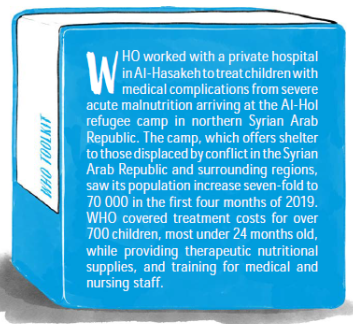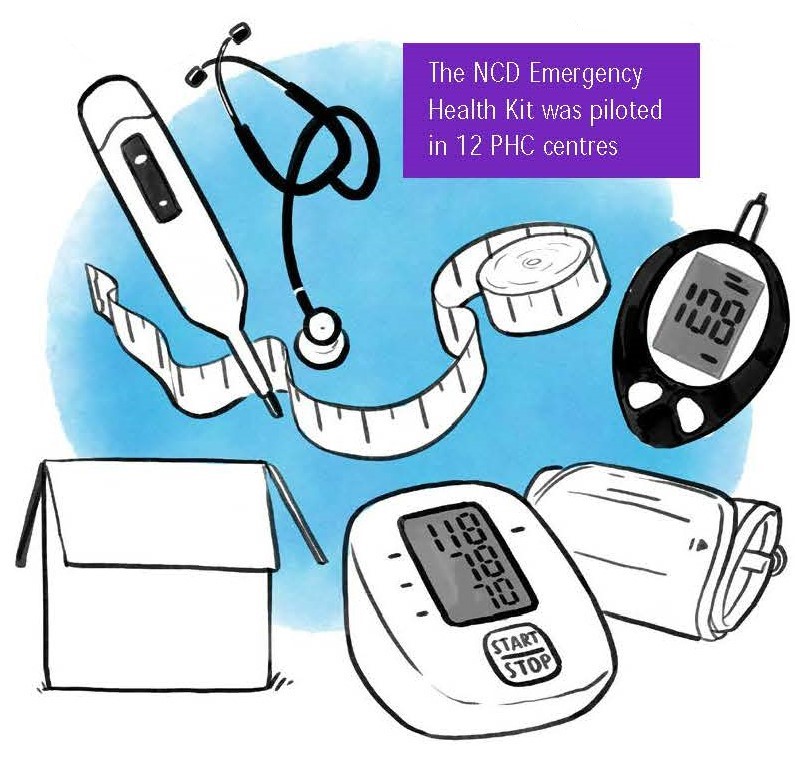World Health Organization. Regional Office for the Eastern Mediterranean
Improving service provision for people living with NCDs in occupied Palestinian territory: Lessons from the COVID-19 pandemic
04 Oct 2023
World Health Organization. Regional Office for the Eastern Mediterranean | 11 Sep 2023
Years of conflict has severely affected the Syrian Arab Republic health system, which is being supported by nongovernmental organizations and UN agencies, including WHO. Emergencies, complicated by high numbers of displaced people, mask noncommunicable disease (NCD) issues and make them more difficult to treat. The aim of WHO and others is to address NCDs and other problems, while creating systems that can be taken forward by Syrian Arab Republic authorities.
 WHO has piloted the NCD Emergency Health Kit in 12 primary health care centres to help people manage diabetes, hypertension, chronic respiratory disease, and certain mental health conditions.
WHO has piloted the NCD Emergency Health Kit in 12 primary health care centres to help people manage diabetes, hypertension, chronic respiratory disease, and certain mental health conditions.
The Syrian Arab Republic enforced a ban on waterpipe use in public places, reinforced by an awareness campaign linking tobacco use with the spread of COVID-19.
In 2021, WHO Syrian Arab Republic and local nongovernmental organizations in rural Damascus launched the “My Hero Is You” campaign to reduce COVID-19 anxiety and fear in children.
With WHO support, nongovernmental organizations have been integrating mental health and psychosocial support at community level through family well-being centres and mobile teams.
In 2021 alone, WHO funded around 50 000 mental health consultations across the Syrian Arab Republic through community-based projects and over 65 000 consultations through primary health care centres.
The Ministry of Health of the Syrian Arab Republic banned the use of waterpipes in public places and ran an awareness campaign highlighting the link between smoking and COVID-19. It also addressed the issue of private tobacco use. It successfully launched a smoke-free home initiative with the message “Stay home without smoking”, while opening 11 tobacco control clinics across the country.
The Ministry of Health also collaborated with the Ministry of Higher Education to launch the Tobacco-Free Universities Initiative.
WHO has developed a programme to deliver community-based mental health support in the Syrian Arab Republic, by working with nongovernmental organizations running community centres across the country. By creating family well-being spaces within these community centres, WHO and its partner nongovernmental organizations have been integrating mental health and psychosocial support services where they are needed most – in the heart of the community.
The programme provides mental health and psychosocial support services to the whole family, not just individuals. Mobile teams can also offer treatment. Services include:
In 2019, family well-being centres and mobile teams provided approximately 89 000 mental health and psychosocial support consultations, including over 55 000 group sessions and 9000 individual sessions.
In 2021, WHO and its partners across the Syrian Arab Republic delivered over 323 000 courses of treatment as part of therapeutic interventions for mental health conditions.
Behind each intervention is a person whose life has been affected by mental health issues. For example, Batoul is a young woman who received treatment as an internally displaced person living in Al-Hol camp. She was anxious, hearing voices and self-harming to control her symptoms.
After assessment she was referred to a psychiatrist, who diagnosed schizophrenia and gave her an individually tailored treatment plan. Batoul is now “living a normal life” after receiving treatment, nine months of counselling, and support from a WHO-supported community worker.
One in ten people in the Syrian Arab Republic live with a mild to moderate mental health condition and the COVID-19 pandemic has strained the population’s mental health and well-being further. In 2020, the UN’s Inter-Agency Standing Committee developed “My Hero Is You” - a storybook to help children and parents around the world to think together about the pandemic and its effects. In 2021, WHO Syria worked with the Solidarity Response Fund, and Al-Tal and Al-Qutayfah nongovernmental organizations to pilot a project adapting “My Hero Is You” to the Syrian Arab Republic setting. The aim was to empower children, parents and caregivers by giving them the tools and skills to reduce anxiety, stay mentally resilient and adapt to “a new normal”.
The pilot reached 5000 children and provided psychosocial support sessions and focus group discussions to parents, caregivers and health educators. WHO plans to replicate this successful initiative in Homs, Aleppo and other governates.
 Integrating NCDs into PHC
Integrating NCDs into PHCEven during times of conflict, NCDs have been estimated to account for 44% of deaths in the Syrian Arab Republic. Addressing NCDs in emergency settings is complicated, but the Syrian Arab Republic experience gives an example of how it can be done.
In 2016, WHO established the Gaziantep Hub for northwest Syria in order to provide mental health and psychosocial support alongside NCD initiatives, including the training of over 200 physicians. The Gaziantep Hub then piloted the introduction of the NCD Emergency Health Kit to three primary health care centres in 2018 and nine more centres across north-west Syrian Arab Republic in 2019. Each NCD kit provides the medicines, devices and supplies required to meet the priority NCD health needs of 10 000 people for three months.
The nine additional primary health care centres also established an NCD system of care, adapting the WHO Package of Essential NCD interventions, and following the HEARTS technical package for the prevention and management of cardiovascular diseases. The centres created dedicated NCD care teams, which developed standard operating procedures and trained physicians on the Mental Health Gap Action Programme (mhGAP), enabling them to treat mental health disorders in addition to the mental consequences of NCDs. The centres saw over 23 000 new and follow-up cases in eight months and screened all those aged 40 and above for cardiovascular disease.
Integrating NCDs into these primary health care centres has improved patient outcomes and contributed to the development of northwest Syria’s district health information system.
This country story is part of a series on sharing successful strategies from the Eastern Mediterranean Region mitigating noncommunicable diseases and mental health disorders during the COVID-19 pandemic and beyond. Discover additional stories and insights in the full report published by the World Health Organization Regional Office for the Eastern Mediterranean.